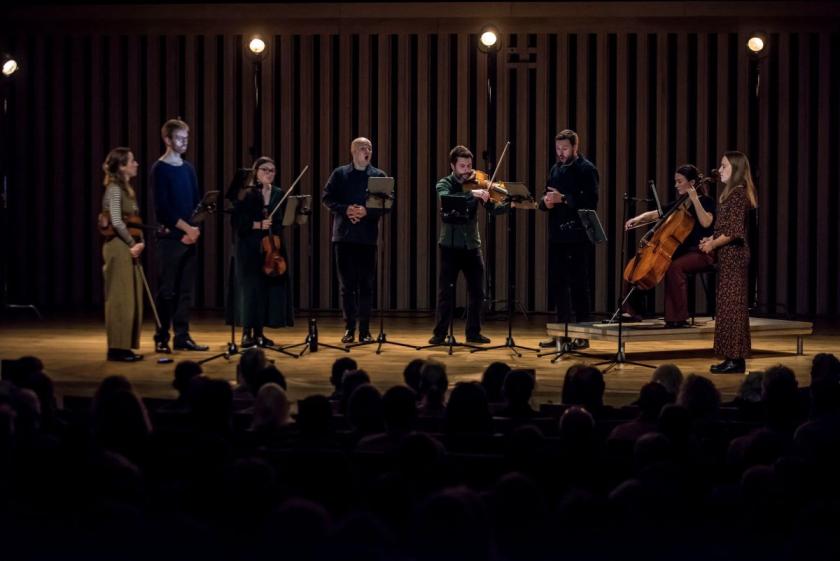You have to admire Samantha Fernando’s concept of the “To Do” list. Hers has one item: “Do Less”. That’s the subtitle of one section of the new work, Wintering, for which she wrote both words and music.
It was heard for the first time in the North of England last night in a concert by four voices of the Marian Consort and a Manchester Collective string quartet (the premiere was at the Wigmore Hall last week).
Oddly enough, there’s nothing about winter in the evocation of a guided meditation, with a soprano voice speaking the random thoughts actually going on in the head of a participant, which forms this, the most substantial of the work’s six parts. There are mentions of cold, whiteness, quiet, snow and eventually winter itself in the others, though, so the fact that it’s about “embracing life’s fallow periods” and finding value in winter’s experiences is clear. And that idea is the basis for the whole programme of music shared by the four voices and four string instruments, interwoven and combined in imaginative ways.
There’s music by Lassus, Jonathan Dove, Andrzej Panufnik and David Lang, extracted in some cases from longer published originals and sequenced, in characteristic Manchester Collective style, to make a “playlist” with its own effect. (It may have been a bit different in its order of events last week, and it may yet be different in the remaining touring performances, but I’m describing the Manchester one.)
Controlled lighting is part of the ambience-creating presentation of many a Manchester Collective show, and in this case that meant some slow dimming or brightening of the set of lamps surrounding the performers, as the music was seen to require, even to the point of near-total darkness. Nice idea, but since they had gone to the trouble of providing a 20-page programme booklet with complete words of all the pieces (with translations from the Latin when necessary), as well as some illuminating notes, it was puzzling that for much of the time it was impossible to read them, and even the best singers’ diction is not going to enable every nuance to be appreciated.
The Marian Consort are among the best singers in the world, and the quality, tuning and blend of these four voices’ output (Caroline Halls, Rory McCleery – its founder and director – Will Wright and Jon Stainsby) was wonderful to hear. Even more so was the interaction and synthesis of instrumental and vocal colours as they combined with the four strings of Sara Wolstenholme, Lily Whitehurst, Alex Mitchell and Peggy Nolan.

Wintering begins with the barely perceptible sounds of deep breathing (a hint of the meditation exercise to come) and white noise, acquiring those of close chords from the singers and strings, to which a wide-spaced soprano solo is added, plus a “hup, hup, hup” that might be a lonely bird’s song, growing into dissonance and ending in brief concord. There’s a sense of stasis almost throughout, brightened variously by a recitative-style cello pizzicato, or a vocal solo, duet or other combination, or instrumental decoration (and at one point, a nervy and unsettled undertow) to intoned sung chords. Samantha Fernando (pictured above) has provided these performers with a remarkable piece: I wonder how many others might be able to bring it off so well?
That “To Do: Do Less” section is, frankly, very funny and earned its own applause – but I didn’t hear anyone laugh. The Collective’s ambience-based concert experience can be just as inhibiting as any po-faced traditional concert procedure.
The Prologue and four bits of Orlando di Lassus’ Prophetiae Sibyllarum (the supposed prophecies of the virgin birth of Jesus found in Sibylline oracles) were split between the opening of the evening and the middle of the second part. These extraordinary examples of chromatic harmony and seasick-inducing chord sequences were given in a variety of textural combinations, from voices-only to a final glorious eight-part spread, exemplifying the virtuosity of the Marian Consort’s skills in 16th century style and one-to-a-part singing.
And Panufnik’s Song to the Virgin Mary, of 1970, likewise rendered for solo voices and the string quartet, was a joy as it concluded the evening (especially its lovely rustic-sounding middle section as the bass voice dominates and the soprano hovers in the background) – the final crescendo, with increasing richness in the harmonic language, was a thrill.
Three parts of Jonathan Dove’s Out of Time (“Stomping”, “Lively” and “Fast”), written for string quartet in 2001, were jolly and jazzy but had the feeling of being there at the opening of the second half as a bit of a filler and brightener-upper – and I could not see how two chunks of David Lang’s the national anthems (2014), one inserted after the first Lassus excerpt and one before the second, made sense in the context at all, boring stuff that they are.
· Further performances: 28 Nov – Leeds, Howard Assembly Room; 29 Nov – Liverpool, The Tung Auditorium; 3 Dec – York, Sir Jack Lyons Concert Hall; 5 Dec – Bristol Beacon














Add comment